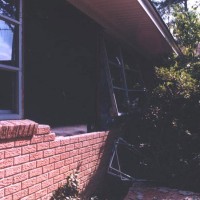The cause of an explosion can result from a chain of events in some cases. In many residential explosions and resulting fires, the facts can point to a number of potential causes. Certified fire and explosion investigators, like Warren engineers, have the experience and training to uncover and evaluate scenarios with high degrees of certainty. In some cases, like one residential explosion we investigated, the chain of events can start days before the loss.
The Incident
A significant explosion ripped through a home on September 4. The powerful explosion blew out sections of the home’s brick veneer and windows. After the incident occurred, a neighbor arrived and shut off the gas supply on the home’s 123-gallon propane tank.
The Investigation
From interviews, we learned a lightning strike had occurred near the home on September 2, but the homeowner found no visible damage to the residence or appliances. We also learned that, before the explosion, the home’s propane tank was refilled with 95 gallons. The neighbor who shut off the supply after the explosion reported the tank had frost on it and that the gauge read about 32 percent.
Under the home, we discovered a hole in the copper line supplying propane to a set of gas logs in the den. What’s more, the hole occurred exactly where the copper was in close proximity to a partially buried cast iron waste pipe. We observed charred floor joists above the copper line, indicating a fire had burned for some time after the explosion. There were two potential causes to explain the hole.
Theory One — Galvanic Corrosion
We quickly eliminated galvanic corrosion as the cause. With iron’s much higher electrode potential, the copper would have acted as a cathode, the receptor of metallic ions from the iron pipe, and would have been protected rather than corroded.
Theory Two — Electrical Arc
The alternate theory was quite plausible. The lightning strike on September 2 likely caused an electrical arc between the iron and copper pipes and melted part of the copper pipe. Gas flowed through the hole into the home’s crawl space where it accumulated until reaching explosive concentration. A second electrical arc, during the cycling of the home’s water heater, likely triggered the explosion. Singed insulation was observed near the water heater, an indication of a flash from the explosion.
Only through a systemic investigation were we able to uncover the cause of the loss. While it was easy to see the home had suffered a gas-related explosion, there were different ways the dangerous situation could have developed. After sifting through interviews, facts and evidence, the cause became quite clear. What might seem like two unrelated events, two days apart, were tied together by the analysis of the time it took for the small leak to accumulate enough gas in the crawl space to reach the lower explosive limit for propane.
Founded in 1997, The Warren Group, forensic engineers and consultants provides technical investigations and analysis of personal injury and property claims as well as expert testimony for insurance adjusters and attorneys. Extremely well versed in the disciplines of mechanical, electrical, chemical, structural, accident reconstruction and fire and explosion investigation, our engineers and consultants are known for delivering the truth — origin, cause, responsibility and cost of an event or claim — with unmistakable clarity.






